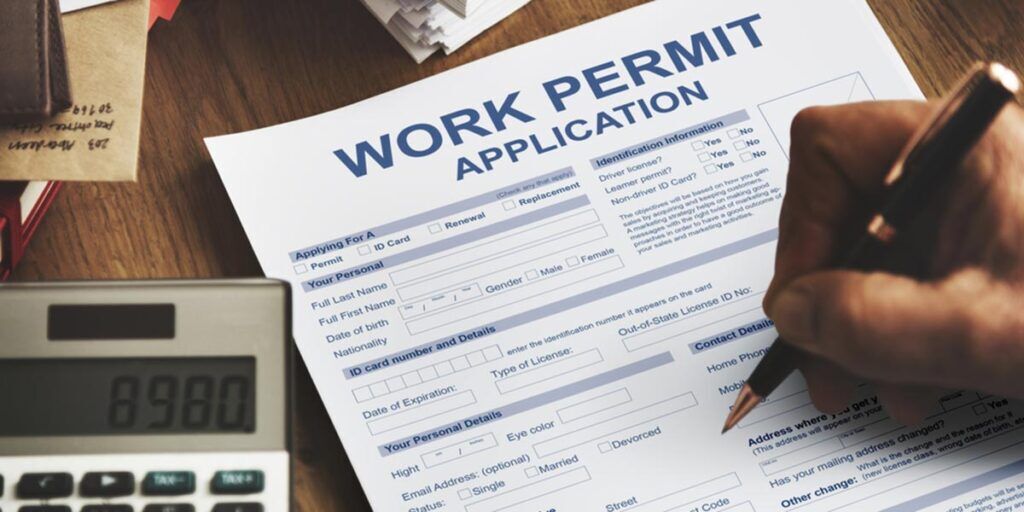If you are one of the many foreigners who consider Thailand a dream country and wish to stay here long term, working in Thailand is one of the most preferable and practical options out there. Every foreigner who works in the Kingdom must possess a work permit, but the process of obtaining one can be overwhelming for some. Nonetheless, the work permit allows you to exercise your rights and benefits as an employee in Thailand, and engaging in work without a proper permit will result in punishment as enforced by the law.
Before you decide to relocate to this beautiful country, it will be useful for you to know about all the fundamentals and requirements of getting a work permit and work visa to ensure you can enjoy your life in Thailand while staying compliant. This complete guide will navigate you through the process.
Thai Work Visa and Thai Work Permit – What’s the Difference?
In some countries work visa may have the same meaning as a work permit, but not in Thailand. Foreigners may be confused and assume that once they have obtained a work visa, they can start working without having to go through other processes, and that is inaccurate. To work in Thailand legally, foreigners will need to have both a work visa and a work permit. These two are not interchangeable.
- A Work Visa is required for all non-Thai citizens who intend to work in Thailand and should be applied from their home countries. There are different types of visas that allow foreign nationals to later apply for a work permit once they entered Thailand, such as the Non-Immigrant B visa, Thai marriage visas, etcetera. The work visa is issued by the Royal Thai Embassy, or the Consulate and the official visa document will be present on the passport.
- A Work Permit is to be obtained once the foreigners have entered Thailand with a proper work visa. It is a legal document issued by the Ministry of Labor outlining the foreign employee’s occupation, position, and the hiring company. This permit allows non-Thai citizens to legally engage in work or start a business in Thailand.
What are the Types of Work Visa?
As previously mentioned, there are various types of Non-immigrant visas that allow foreign nationals to work in Thailand. Foreigners will need to select the type of visa that best suits their condition and the type of work they intend to perform. It is recommended to look into the types of work activities that are prohibited to foreigners stated in the Foreign Business Act before conducting any kind of business in Thailand.
Here are the types of Non-immigrant visas foreigners can apply for work-related purposes.
Non-immigrant B Visa (Business Visa)
This is the most common type of work visa that is issued to foreigners who work in Thailand as employees as well as those who wish to conduct business in the Kingdom. Foreigners should apply for a Non-immigrant B visa in their country of origin which generally permits foreigners to stay in Thailand for 90 days. Once the work permit is granted within those 90 days, then foreigners can apply for a one-year Non-immigrant B while in Thailand with the company’s assistance.
Non-immigrant B-A Visa (Business Approved Visa)
This type of visa is normally granted to those who invest in a business in Thailand. The associated company in Thailand may assist in processing the visa on behalf of the foreign investor. The visa is valid for one year. However, the issuance of this visa is not very common and most likely depends on the discretions of the embassy or the consulate.
Non-immigrant IB visa (Investment and Business Visa)
The Non-immigrant IB visa is for foreign nationals who intend to work for companies or projects under the Board of Investment of Thailand (BOI)’s promotion. These are the projects approved by BOI as helping to foster benefits for the Kingdom.
Non-immigrant M visa (Media Visa)
This type of visa is issued to foreigners planning to work in the media industry in Thailand, such as television, film, or online media. Depending on the specific type of media work the foreigners will carry out, approvals from related authorities may be required.
Non-immigrant O Visa (Accompanying Family Members)
If the foreigner who is granted a work visa wishes to bring his/her spouse or family members to Thailand, the accompanying family members should obtain the Non-immigrant O visa. This type of visa is also granted to foreign nationals engaging in volunteer work, those who are married to Thai citizens, and retirees.
Smart Visa
Smart Visa is a new category of visa issued to foreign professional talents with specific skills and experience, foreign investors, startup entrepreneurs, executives, and family members of the Smart Visa holders. These highly skilled professionals must work in the targeted industries, such as biotechnology, smart electronics, biochemical, etcetera.
Those who are granted Smart Visa can stay in Thailand for 4 years and are eligible for special privileges including work permit exemption.
Once the official visa is secured, the next step is to apply for a work permit with the help of the company in Thailand that the foreigners are engaged with. The work permit must be obtained before commencing any work activities.
Requirements For Thai Work Permit
Foreigners who are interested in working in Thailand should note that not every business entity is able to offer work permits for foreign employees. There are certain conditions both the company and the foreign professional must meet in order to apply for a work permit.
The general requirements for companies include:
- Officially registered as a juristic entity in Thailand
- A minimum of 2 million Baht registered capital per one work permit
- Employed at least 4 Thai nationals for each work permit
- For overseas registered companies, the minimum capital required is 3 million baht per permit.
Exemptions from these requirements can be granted in case the company is promoted by BOI. Nonetheless, the company must provide an explanation to BOI regarding the reasons foreign employees are necessary for the project.
The foreign individual applying for a work permit must also meet certain qualifications. These include:
- An appropriate type of Non-immigrant visa
- A proper job offer from a company in Thailand
- Education background and work experience applicable to the area of work that the individual will perform
- Relatively healthy without serious diseases or addictions
Documents Needed to Apply for Work Permit
In most cases, employers will be the party in charge of submitting a work permit application which can be done before or after the foreign employee enters Thailand. However, the employee must be present when the work permit is collected.
Below contains the lists of documents required from the company and the foreign individual.
Documents from Company:
- Work Permit Application Form
- Company registration certificate and list of shareholders
- VAT certificate and filings
- Social security payment forms
- Corporate income tax filings
- Employment contract between the company and the foreign individual
Documents from Foreign Employee:
- Original passport and copies of Non-immigrant visa page, latest entry page, and biodata page
- Copies of work experience certificates from previous employers
- Copies of educational certificates or degrees
- Recently issued medical certificate
- Three 3×4 cm photos taken no more than 6 months
- Other relevant certificates and licenses
The copies of each original document must be signed. In addition, some documents may need to be translated into Thai, especially if they are in other languages that are not English. Hence, it is recommended to prepare these documents ahead of time.
Work Permit Application Process in Thailand
Once all the documents are prepared, the foreign employee or the company will need to submit the work permit application documents at the Ministry of Labor. However, if the company is promoted by BOI, the work permit will firstly need to be requested through the BOI system for approval, then the work permit will be issued at the One-Stop Service Center.
Step 1: Apply for an Appropriate Non-immigrant Visa
As previously mentioned, to be eligible for a work permit, a foreign professional must first possess a non-immigrant visa that will allow a non-Thai citizen to work in Thailand. The visa can be applied at the Thai Embassy in the foreigner’s home country prior to entering the Kingdom. If the foreigner is already in Thailand with a tourist visa, he/she must convert the tourist visa to a non-immigrant visa. This type of visa is valid for 90 days and can be extended once the work permit has been issued.
The required documents to apply for a non-immigrant visa may vary depending on each embassy’s conditions. Below are the general documents that will be necessary.
- Non-immigrant visa application form
- A job offer from an entity in Thailand
- Original passport with at least 6 months of validity
- Employment contract between the company and the foreign employee
- Letter of invitation from the hiring company stating the job details
- Other documents requested by the embassy or the consulate
Step 2: Apply for Work Permit
The work permit application process should be completed within 90 days before the applicant’s non-immigrant visa is expired. The official work permit booklet will be issued by the Department of Labor to foreign employees. Both the hiring company and the foreign employee must meet the qualification prescribed by the Labor Department to be considered for a work permit.
For an application that meets certain requirements or is submitted under a BOI promoted company, it can be processed at the One-Stop Service Center for one-day approval.
Step 3: Work Permit Approval
Once all of the application documents are filed, the applicant will receive a notification slip stating the date when the permit can be collected. On the collection day, the foreign applicant must be present with the original passport to receive the work permit stamp from the Labor Department.
The process usually takes 7-10 business days if submitted in Bangkok. In the case of an application issued in Phuket, it may take up to 2 months.
It is important to note that the work permit will only be valid for a maximum length of one year and will need to be extended. The case will be different for a BOI-promoted company.
After the work permit is obtained, the foreign employee must process the visa extension from 90 days to at least one year.
Work Permit Restrictions and Obligations
Foreigners who have received a work permit are only allowed to work for the company and within the roles stated in the permit. Working outside the scope of the permit may result in punishment, such as imprisonment and a fine.
Furthermore, maintaining a work permit comes with obligations.
Income Tax Filing
The foreign employee must obtain a personal tax identification number from the Revenue Department. The process is simple and can be completed in one day with the proper documents. With the tax ID, the foreign employee will be able to file his/her annual income tax.
90-Day Notification
Every expatriate who is permitted to stay in Thailand for the long term is obligated to report his/her current residence to the immigration office every 90 days. This can be done in person at the Thai immigration office, by mail, or with the help of an agent. Here is the step-by-step guide for the 90-day online reporting.
Re-entry Permit
If the foreigner holds a single-entry visa and desires to leave and re-enter Thailand, he/she must first apply for a re-entry permit. The visa is directly associated with the work permit. Therefore, if the foreigner leaves the country and causes the visa to be void, it will affect the work permit. The application for the single or multiple re-entry permit can be processed at the immigration office or the immigration desk at the airport.
Termination, Changes, and Renewal of Work Permit
Termination of Work Permit
Once the employment comes to an end, the termination shall be reported to the Labor Department for the cancellation of the work permit and visa. The foreigner is usually given an extension of stay for seven days to leave Thailand.
Changing Jobs
If the foreign employee wishes to change jobs while staying in Thailand, he/she must agree on the resignation date with the current company which is when the company will process the cancellation of the work permit. In the meantime, the new employer must prepare the documents for the new work permit application and the extension of stay. If the permission to stay in Thailand expires before the documents get submitted to the Immigration Office, the foreigner will have to leave the country in order to apply for a new non-immigrant visa and work permit.
Renewal of Work Permit
The work permit must be extended or renewed before the expiration date. The foreign employee and the hiring company must ensure that the employee’s visa is extended first in order to renew the work permit. The required documentation is the same as the ones submitted for the initial work permit application.
How Much Does It Cost?
Non-immigrant B visa (business visa) fees:
- Single-entry fee of 2,000 Baht with three months validity
- Multiple entries fee of 5,000 Baht with one-year validity
Work permit application fees:
- Application fee of 100 Baht
- Work permit fee of 750 Baht for three months validity
- Work permit fee of 1,500 Baht for three to six months of validity
- Work permit fee of 3,000 Baht for one-year validity
- Other fees, such as translation and legalization of documents
The working visa and work permit applications require detailed preparation. To ensure the start of your career or business venture in Thailand is as seamless as possible, the local lawyers can help simplify the process and guide you through all the steps. Reach out to us for professional support.




































